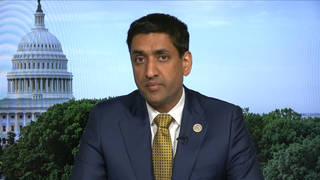
Guests
- Andrew Bacevichprofessor emeritus of international relations and history at Boston University. He is a retired colonel and Vietnam War veteran. His recent piece for The Nation is headlined “Trump is Not the Problem.”
On Tuesday, President Trump shocked the world by hinting the U.S. could carry out a nuclear strike on North Korea. Hours after he spoke, North Korea threatened to strike the U.S. territory of Guam in the western Pacific. China has warned that a “war of words” between the U.S. and North Korea could spiral out of hand. We speak with Andrew Bacevich, professor emeritus of international relations and history at Boston University. He is a retired colonel and Vietnam War veteran.
Transcript
AMY GOODMAN: This is Democracy Now!, democracynow.org, The War and Peace Report. I’m Amy Goodman, with Nermeen Shaikh. Our guest now is the retired Colonel Andrew Bacevich, a Vietnam veteran and professor at Boston University. Nermeen?
NERMEEN SHAIKH: So, Andrew Bacevich, we’d like to get your response to the escalating rhetoric on North Korea and how you think this fits into other comments that Trump has made and positions that his administration has taken on other foreign policy issues confronting the U.S.
ANDREW BACEVICH: Well, I’m struck by the fact that six months into his administration, this really is the first genuine national security crisis that he’s had to face, and his initial performance is very troubling. You know, when I think about that “fire and fury” statement, one of the things that strikes me is that I think it’s a sort of a fundamental of diplomacy 101 or politics 101 that when a public figure makes a public statement, it has to be done in a way that it will play to multiple audiences. So, it’s not inappropriate, I think, for the administration to issue warnings directed at the North Korean regime, but it’s absolutely imperative that the warnings be voiced in such a way that they reassure American allies in the region—South Korea, Japan—should be voiced in a way that doesn’t create panic here at home. And on that score, it seems to me that the president has failed radically.
Furthermore, there’s been a lot of hopeful commentary, especially, I think, in the last 10 days or so, since General Kelly became the White House chief of staff, that the generals that President Trump has surrounded himself with—not only Kelly, but also McMaster and Mattis in the Pentagon—that they will be the voices of reason, that they will—they will rein in this impulsive president. And if we are to look at the “fire and fury” statement, that’s pretty clear indication that our president is not about to be reined in. And that also has to be very, very troubling.
AMY GOODMAN: In fact, one of the concerns of many, as he is in—mired in domestic problems at home—I mean, just yesterday, we also learned that, actually, two weeks ago, his former campaign manager, Manafort, has his—had his home raided by the FBI, that as Trump feels increasingly encircled and under pressure, that he’s going to look for an enemy abroad to divert attention to. Do you think that there could be this very strong connection, as he uses words like “fire and fury,” is what he’s actually feeling here at home, but trying to project attention away from what he’s facing here?
ANDREW BACEVICH: Well, I think that’s very plausible. And he would not be the first president in our history or the first major figure in world history to try to generate problems abroad in order to detract attention from problems at home.
But that said, you know, one of the things that strikes me about this president is his inability to use the English language with any sort of precision or finesse. And I think this was evident in spades in the “fire and fury” statement. And we should emphasize that it was a threat of “fire and fury,” meaning—necessarily meaning the use of nuclear weapons, in response to further threats. And I think it’s that, the notion that threats voiced by another country could lead to preemptive nuclear attack by the United States of America—I think it’s that—that notion, which is embedded in that statement, is what causes great concern and, again, is what is so indicative, and indicative in such a troubling way, about the inability of this individual to speak with some understanding of the implications of what he says.
I mean, many people have commented—and I think accurately commented—on the narcissism, which seems to be such a prominent characteristic of Trump’s personality. And you—when you watch the video of him making that “fire and fury” comment, it’s difficult to avoid thinking that the motivation of the moment is to make himself feel good, to somehow demonstrate that he’s a tough guy, that he’s standing up to what he perceives as a threat, and to, somehow or other, derive some sense of personal satisfaction from that—from issuing that threat, utterly oblivious as to the larger implications and how that statement will play to other audiences. And that’s—that’s got to be very troubling.
And again, to emphasize the fact that he still does these things, despite the fact that he’s now surrounded by, ostensibly, more mature figures, does not bode well for how well this crisis is going to play out. But it doesn’t bode well for how other crises, which he will inevitably encounter—how other crises are going to play out.
AMY GOODMAN: Well, we want to thank you very much, Andrew Bacevich, for joining us. Andrew Bacevich is a retired colonel and professor. This is Democracy Now!, democracynow.org, The War and Peace Report. Back in a minute.













Media Options